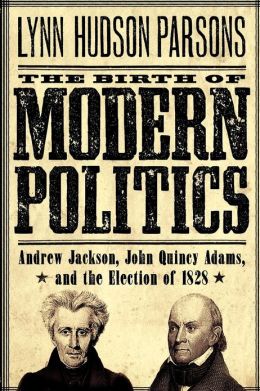I have been reading The Birth of Modern Politics: Andrew Jackson, John Quincy Adams, and the Election of 1828 by Lynn Hudson Parsons. It occurs to me that the author might have given more attention to the frequent election of military heroes of recently past wars.
- Washington after the Revolutionary War
- Jackson after the War of 1812
- William Henry Harrison, after the Battle of Tippecanoe in 1811
- Zackary Taylor after the Mexican-American War
- Filmore and Pierce also served in the Mexican-American War
- Grant after the Civil War
- Hayes, Garfield, Arthur, Benjamin Harrison and McKinley also served in the Civil War
- Theodore Roosevelt in the Spanish-American War
- Truman served in World War I
- Eisenhower after World War II
- Kennedy, Johnson, Nixon, Ford and George H. W. Bush served in World War II
- Carter graduated from the Naval Academy after World War II and serving during the Korean War.
It is not intuitive today, but Harrison, Jackson and Taylor gained national fame in Indian wars. Even Lincoln served as an officer in the militia during the Black Hawk War.
Washington, Jackson, the first Harrison, Taylor, Grant, and Eisenhower all were known nationally due to their leadership in war before their election to President. Teddy Roosevelt also gained considerable fame leading the Rough Riders on San Juan Hill. For many other presidents, service in the armed forces during wartime was an important part of their background leading to the presidency. Even George W. Bush served in the National Guard during the Vietnam War.
Washington, Jackson, the first Harrison, Taylor, Grant, and Eisenhower all were known nationally due to their leadership in war before their election to President. Teddy Roosevelt also gained considerable fame leading the Rough Riders on San Juan Hill. For many other presidents, service in the armed forces during wartime was an important part of their background leading to the presidency. Even George W. Bush served in the National Guard during the Vietnam War.
It is hard to see Andrew Jackson as a viable candidate for President had he not become famous as a general and especially leading the successful American troops in the Battle of New Orleans. Indeed, might his election to president have been another example of public support for a military hero?
The Adams Route
Many presidents were diplomats, Secretary of State or both en route to the presidency.
The Adams Route
Many presidents were diplomats, Secretary of State or both en route to the presidency.
- John Adams was a diplomat
- Jefferson, Monroe, Madison, John Quincy Adams and Van Buren had all served as Secretary of State
- William Henry Harrison had been a diplomat
- Buchanan also served as Secretary of State
- Hoover, while not a diplomat, gained national visibility managing international relief programs during and after World War I.
Of course, many presidents had previously served in other Cabinet offices or as vice president. After Jackson, may had been professional politicians, often serving in the Congress or in high state offices.
Thus, while leading American armies in battle was an important route to the presidency from Washington to Eisenhower, diplomacy was important only in the early days of the nation. Perhaps when the Republic was new and less powerful, international diplomacy was more important to its voters. As Parsons' book indicates, the rise in political parties made political party credentials important. The Presidential Succession Act of 1947 put the Speaker of the House and President pro tempore of the Senate before the Secretary of State and other cabinet officers in line for the presidency.

No comments:
Post a Comment